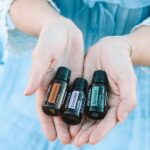In today’s fast-paced and stressful world, finding effective ways to relax and unwind is essential for maintaining our mental and physical well-being. One popular method for stress relief is the use of essential oils. Essential oils are highly concentrated plant extracts that have been used for centuries for their therapeutic properties. They can be used in a variety of ways, including aromatherapy, massage, and topical application. In this article, we will explore the benefits of essential oils for stress relief and discuss the top five essential oils that can help promote relaxation and calmness.
How Essential Oils Work
Essential oils have a direct impact on the brain and body, which is why they are so effective in promoting relaxation and reducing stress. When inhaled, the molecules of essential oils stimulate the olfactory system, which is responsible for our sense of smell. The olfactory system is directly connected to the limbic system, which controls emotions and memories. This connection allows essential oils to have a profound effect on our mood and emotions.
In addition to their impact on the brain, essential oils also have physical effects on the body. When applied topically, they can penetrate the skin and enter the bloodstream, where they can have a systemic effect on the body. Some essential oils have anti-inflammatory properties, which can help reduce physical symptoms of stress such as muscle tension and headaches.
Top 5 Essential Oils for Stress Relief
1. Lavender oil: Lavender oil is often referred to as the ultimate stress-buster due to its calming and soothing properties. It has been used for centuries to promote relaxation and improve sleep quality. Lavender oil can help reduce anxiety, lower blood pressure, and promote a sense of calmness.
2. Peppermint oil: Peppermint oil has a refreshing scent that can help reduce stress and anxiety. It has been shown to improve cognitive performance and increase alertness. Peppermint oil can also help relieve tension headaches and muscle pain, which are common symptoms of stress.
3. Bergamot oil: Bergamot oil has a citrusy scent that is uplifting and energizing. It can help reduce anxiety and promote a positive mood. Bergamot oil is also known for its ability to reduce cortisol levels, which is the hormone responsible for stress.
4. Ylang-ylang oil: Ylang-ylang oil has a sweet and floral scent that promotes relaxation and calmness. It can help reduce anxiety, improve mood, and promote better sleep quality. Ylang-ylang oil is also known for its aphrodisiac properties, making it a great choice for couples looking to reduce stress and enhance intimacy.
5. Frankincense oil: Frankincense oil has been used for centuries for its calming and grounding properties. It can help reduce anxiety, promote deep relaxation, and improve focus and concentration. Frankincense oil is also known for its ability to enhance spiritual experiences and promote a sense of inner peace.
Lavender Oil
Lavender oil is one of the most popular essential oils for stress relief, and for good reason. It has a calming and soothing scent that can help reduce anxiety and promote relaxation. Lavender oil has been used for centuries to improve sleep quality and relieve symptoms of stress.
In addition to its calming properties, lavender oil also has anti-inflammatory and analgesic properties, which can help reduce physical symptoms of stress such as muscle tension and headaches. It can also help improve digestion and relieve digestive discomfort, which is often associated with stress.
There are several ways to use lavender oil for stress relief. One of the most popular methods is aromatherapy, where you inhale the scent of lavender oil using a diffuser or by adding a few drops to a tissue or cotton ball. You can also apply lavender oil topically by diluting it with a carrier oil and massaging it into your skin. Another option is to add a few drops of lavender oil to your bathwater for a relaxing and soothing soak.
Peppermint Oil
Peppermint oil is known for its refreshing and invigorating scent, which can help reduce stress and anxiety. It has been shown to improve cognitive performance and increase alertness, making it a great choice for those who need a little pick-me-up during stressful times.
In addition to its mood-boosting properties, peppermint oil also has analgesic and anti-inflammatory properties, which can help relieve tension headaches and muscle pain. It can also help improve digestion and relieve symptoms of irritable bowel syndrome (IBS), which are often exacerbated by stress.
There are several ways to use peppermint oil for stress relief. You can inhale the scent of peppermint oil using a diffuser or by adding a few drops to a tissue or cotton ball. You can also apply peppermint oil topically by diluting it with a carrier oil and massaging it into your temples, neck, or other areas of tension. Another option is to add a few drops of peppermint oil to your bathwater for a refreshing and invigorating soak.
Bergamot Oil
Bergamot oil has a citrusy scent that is uplifting and energizing. It can help reduce anxiety, promote a positive mood, and increase feelings of happiness and well-being. Bergamot oil is also known for its ability to reduce cortisol levels, which is the hormone responsible for stress.
In addition to its mood-enhancing properties, bergamot oil also has antibacterial and antifungal properties, which can help boost the immune system and protect against infections. It can also help improve digestion and relieve symptoms of indigestion, which are often associated with stress.
There are several ways to use bergamot oil for stress relief. You can inhale the scent of bergamot oil using a diffuser or by adding a few drops to a tissue or cotton ball. You can also apply bergamot oil topically by diluting it with a carrier oil and massaging it into your skin. Another option is to add a few drops of bergamot oil to your bathwater for an uplifting and energizing soak.
Ylang-Ylang Oil
Ylang-ylang oil has a sweet and floral scent that promotes relaxation and calmness. It can help reduce anxiety, improve mood, and promote better sleep quality. Ylang-ylang oil is also known for its aphrodisiac properties, making it a great choice for couples looking to reduce stress and enhance intimacy.
In addition to its mood-enhancing properties, ylang-ylang oil also has antiseptic and anti-inflammatory properties, which can help promote healthy skin and relieve skin irritations. It can also help regulate sebum production and balance oily or dry skin, which are often affected by stress.
There are several ways to use ylang-ylang oil for stress relief. You can inhale the scent of ylang-ylang oil using a diffuser or by adding a few drops to a tissue or cotton ball. You can also apply ylang-ylang oil topically by diluting it with a carrier oil and massaging it into your skin. Another option is to add a few drops of ylang-ylang oil to your bathwater for a relaxing and sensual soak.
Frankincense Oil
Frankincense oil has been used for centuries for its calming and grounding properties. It can help reduce anxiety, promote deep relaxation, and improve focus and concentration. Frankincense oil is also known for its ability to enhance spiritual experiences and promote a sense of inner peace.
In addition to its calming properties, frankincense oil also has anti-inflammatory and analgesic properties, which can help reduce physical symptoms of stress such as muscle tension and headaches. It can also help improve respiratory function and relieve symptoms of asthma and allergies, which are often exacerbated by stress.
There are several ways to use frankincense oil for stress relief. You can inhale the scent of frankincense oil using a diffuser or by adding a few drops to a tissue or cotton ball. You can also apply frankincense oil topically by diluting it with a carrier oil and massaging it into your skin. Another option is to add a few drops of frankincense oil to your bathwater for a calming and grounding soak.
Chamomile Oil
Chamomile oil is known for its calming and soothing properties. It can help reduce anxiety, promote relaxation, and improve sleep quality. Chamomile oil is also known for its anti-inflammatory properties, which can help reduce physical symptoms of stress such as muscle tension and headaches.
In addition to its calming properties, chamomile oil also has antispasmodic properties, which can help relieve digestive discomfort and promote healthy digestion. It can also help relieve symptoms of skin conditions such as eczema and psoriasis, which are often exacerbated by stress.
There are several ways to use chamomile oil for stress relief. You can inhale the scent of chamomile oil using a diffuser or by adding a few drops to a tissue or cotton ball. You can also apply chamomile oil topically by diluting it with a carrier oil and massaging it into your skin. Another option is to add a few drops of chamomile oil to your bathwater for a calming and soothing soak.
How to Use Essential Oils for Stress Relief
There are several methods for using essential oils for stress relief, and the best method for you will depend on your personal preferences and needs. Here are some popular methods:
1. Aromatherapy: This is the most common method of using essential oils for stress relief. You can use a diffuser to disperse the scent of the essential oil into the air, or you can add a few drops of the oil to a tissue or cotton ball and inhale the scent directly.
2. Topical application: You can apply essential oils topically by diluting them with a carrier oil such as coconut oil or jojoba oil. Massage the diluted oil into your skin, focusing on areas of tension or discomfort.
3. Bath: Adding a few drops of essential oil to your bathwater can create a relaxing and soothing experience. The warm water helps to disperse the scent of the oil, allowing you to inhale it while you soak.
4. Inhalation: You can inhale the scent of essential oils directly from the bottle or by adding a few drops to a tissue or cotton ball and holding it near your nose.
5. Massage: If you have access to a professional massage therapist, you can ask them to incorporate essential oils into your massage session. The combination of massage and aromatherapy can be incredibly relaxing and therapeutic.
When using essential oils, it’s important to remember that they are highly concentrated and should be used with caution. Always dilute essential oils with a carrier oil before applying them to your skin, and do a patch test before using a new oil to check for any potential allergies or sensitivities.
In conclusion, essential oils can be a powerful tool for stress relief. They have a direct impact on the brain and body, promoting relaxation and calmness. Lavender oil, peppermint oil, bergamot oil, ylang-ylang oil, and frankincense oil are all excellent choices for reducing stress and promoting well-being.
There are several ways to use essential oils for stress relief, including aromatherapy, topical application, and bath. Experiment with different methods and find what works best for you. Incorporating essential oils into your daily routine can help you create a stress-free and balanced life. So why not give it a try and experience the benefits of essential oils for yourself?



